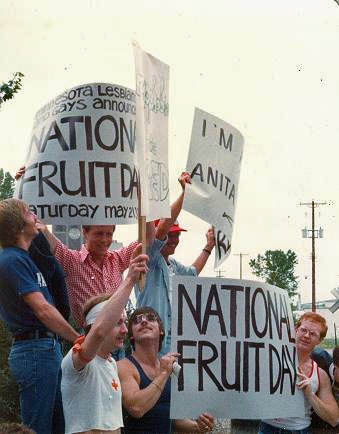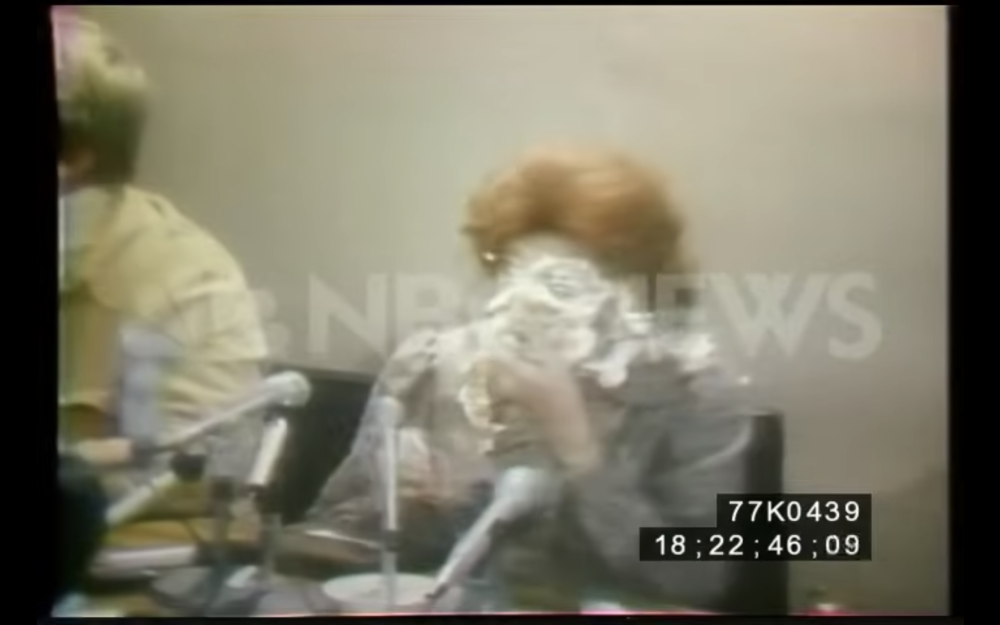800-800-0350
After the Stonewall Uprising of 1969, the LGBTQ+ movement gained momentum, both in establishing visible "Gay Pride" parades and festivals, but also fighting to secure legal protections through municipal non-discrimination ordinances in cities across the country.
Backlash to LGBTQ+ progress resulted in numerous setbacks, primarily in communities that lacked a visible, organized LGBTQ+ movement. The main driver for the anti-LGBTQ+ movement was Anita Bryant and her Save Our Children campaign. Despite the setbacks, LGBTQ+ organizers mobilized across the country to protest, protecting many of the gains made in the 1970s.
Save Our Children
Save Our Children was the first organized opposition to the gay rights movement; Anita Bryant served as president. The group was created in January of 1977 in response to the non-discrimination ordinance that passed in Miami, Florida. Miami was one of nearly 40 cities in the U.S. that had passed ordinances outlawing discrimination against gay men and lesbians.
Save Our Children's strategy was to prey on fear and paint the LGBTQ+ community as amoral, promiscuous, and defiant of traditional gender roles, and that they were a specific danger to children. The group collected 64,000 signatures to force a public referendum on the ordinance.
The vote results in the special election were overwhelming. It was the largest turnout in any special election in the history of Miami-Dade County. In June 1977, voters supported repealing the gay rights ordinance by a margin of more than two to one.

The response from the LGBTQ+ community after the special election was immediate. Just weeks later, more than 250,000 people attended the San Francisco Gay Freedom Day Parade, with thousands more attending pride celebrations across the country.
Encouraged by their success in Miami, Save Our Children continued to target cities to overturn non-discriminations ordinances that had passed, successfully targeting St. Paul; Wichita, Kansas; and Eugene, Oregon, using the same fear tactics that worked in the Florida campaign.
Hearing that Anita Bryant would be visiting St. Paul to help open a fruit warehouse, local organizers planned National Fruit Day on May 21, 1977, reclaiming the pejorative term and connecting to Bryant's work as spokesperson for the Florida Citrus Commission, and "welcomed" the anti-gay crusader to Minnesota. Attended by more than 700 hundred activists, it was one of the largest LGBTQ+ rallies held in Minnesota at that time.
We are a visible sign of our self-respect. We protest the use of false patriotism, distorted religious argument, irresponsible emotionalism, and the unethical use of Vitamin C that Anita Bryant represents.
Bryant's woes with Minnesota activists emerged again on October 14, 1977. While campaigning in Iowa to promote her continued campaign to roll back anti-discrimination laws protecting LGBTQ+ people, Bryant was hit in the face with a pie by Minnesota activist Thom Higgins.
Higgins was a formerly a member of FREE at the University of Minnesota and, together with Bruce Brockway, traveled to Iowa to protest Bryant's press conference.
Decades later, numerous instances of "glitter bombing" in 2011 and 2012 similarly focused on anti-LGBTQ+ politicians, combined protest and spectacle together to raise awareness of LGBTQ+ issues.

Florida Orange Juice Boycott 1977–1980
Since 1969, Anita Bryant had been employed by the Florida Citrus Commission endorsing Florida orange juice in television commercials. Following the Miami referendum, the Coalition for Human Rights and the Miami Victory Campaign organized a boycott of orange juice in opposition to Bryant and her campaign.
Gay bars stopped serving screwdrivers and replaced them with the "Anita Bryant Cocktail", which replaced orange juice for apple juice. Merchandise such as buttons, bumper stickers, and T-shirts with slogans like "A day without human rights is like a day without sunshine" were sold with proceeds going to gay rights activists to fund their fight against Bryant and her campaign.
In 1980, Bryant's contract as spokesperson for the Florida Citrus Commission was ended.
Thom Higgins
Thom Higgins was an writer and gay rights activist, and often credited with coining the term gay pride. As a student at the University of Minnesota, he was terminated from his job at the State Radio Services for the Blind as a result of his affiliation with FREE. In response FREE picketed his former workplace, protesting for anti-discrimination protections.
Together with Brockway, they founded the Positively Gay Cuban Refugee Task Force in 1980. Among the refugees fleeing Cuba were gay men. They were all housed in refugee camps, and unable to leave without an American sponsor. The organization helped mobilize Minneapolis's gay community to sponsor gay refugees, and allow them to leave and resettle.
Higgins died of AIDS-related complications on November 10, 1994
Bruce Brockway
Bruce Brockway was a gay activist and the publisher of the Twin Cities’ first gay newspaper: Northland Companion, later renamed Positively Gay and then GLC Voice under the leadership of Tim Campbell. Brockway was diagnosed with AIDS in June 1982, making him the first documented Minnesotan with the disease.
In April 1983, Brockway helped found the Minnesota AIDS Project (MAP, later merging with the Rainbow Health Initiative to form Rainbow Health), the state’s first grassroots organization set up to help people with HIV/AIDS.
Bruce passed away in 1984.
Further Reading
- Austin, Tyler. "Today In Gay History: Gay Activist Pies Anita Bryant In the Face." Out.com. October 14, 2016.
- Ehrenhalt, Lizzie. "Over the Rainbow: Queer and Trans History in Minnesota." MNopedia.org. May 25, 2021.
- Eugenois, Jillian. "How 1970s Christian crusader Anita Bryant helped spawn Florida's LGBTQ culture war." NBC News. April 13, 2022.
- HISTORY.com. "This Day in History: Anti-gay crusader Anita Bryant is hit in the face with a pie." History.com.
- tpt.prg. "LGBTQ Activist Confronts Anita Bryant." tpt.org.
- Van Cleve, Stewart. Land of 10,000 Loves: A History of Queer Minnesota. University of Minnesota Press, 2012.
